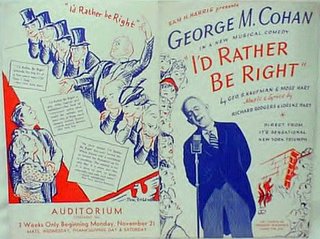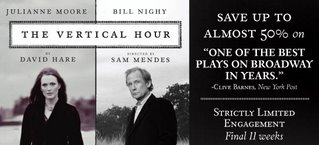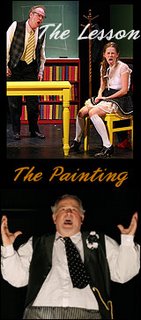photo: Sergio Reynoso
The Country Wife directed by John Ficarrapresented by Vital Theatre Company& HonkBark productionsat the McGinn/Cazale (through January 27)
directed by John Ficarrapresented by Vital Theatre Company& HonkBark productionsat the McGinn/Cazale (through January 27)A classic Woody Allen standup joke goes something like, "Someone asked me if I think sex is dirty. I said only if it's done right."
So if you ask me if Wycherly's The Country Wife is dirty, what else can I say? "Only if it's done right."
A lot of care has gone into this staging of one of the most well-known (that is, least obscure) Restoration comedies. Elaborate costuming, live music, gestural choreography, lots of fluttery "fan" business. But unfortunately none of that has anything to do with what
The Country Wife is about--lust, deception, and hypocrisy.
Often cited as the prime exemplar of early Restoration unhinged ribaldry, Wycherly's 1675 sex farce does not even go through the motions of a comedy of manners. Scene 1- the horny young hero "Horner" enlists his quack doctor to spread false rumors confirming that after a bout of clap in France, his member was so diseased it had to be cut off. The plan is, of course, that the pompous rich burghers of London--too busy with the stock exchange and booming Restoration/early Empire economy anyway--will be more than glad to leave him in the company of their sex-starved wives. Within days, every "desperate housewife" in London is ringing at Horner's door to sample his reputedly inexhaustible supply of "China" in his China closet. At the end, the deception continues to thrive--no hugging, no learning, to quote Sir Larry David. The only lesson is taught by the wives, who turn the tables on Horner to instruct him how women take no second place to men in being "Machiavels of love."
Does this sound like a quaint, polite, wigfest to you? Yet this is what the Vital Company's production ends up doing to the play by making it essentially a museum piece. It made me think how ultimately square so many American theatre artists get when faced with non-Shakespearean European classics. We get distracted by all the surface features and "classy" stuff, but forget about the characters as living, breathing (and, yes, fucking) human beings. Oh, I suppose there's some fucking in this Country Wife, but the comical offstage moans in the China scene just made everything more quaint. Rather, what the play needs is the more adult sensibility of mature sexual desire, like in the great Hollywood screwball comedies. (Lubitsch, for instance, would have the women emerge from the china closet with the sublime and satiated look of an accomplished adultress.)
One doesn't need to dress up these plays in Prada and cell phones to give them a modern sensibility. God knows, the
real 1675 people were able to have real emotions and psychologies while wearing all those get ups. While movement coaches labor actors over all the etiquette of sitting and turning and fanning-- we know even Samuel Pepys must have just flopped down on the floor sometimes in full regalia. (Pepys' diaries, of course, show him and others doing much messier things than that, even.)
The costuming of Horner in this production suggests a nod to the decadent look of Johnny Depp as the Earl of Rochester in the recent
Libertine film. But it's amazing stage artists have not taken the cue from such Restoration-chic in the popular culture to actually infuse such recognizable emotions and attitudes into text of the play. (By the way, the photo above is very much a publicity shot--not a still from the play.)
Or to put it another way, in this day and age it takes a lot to make
The Country Wife dirty again. Not necessarily more dirty stage business, just dirtier minds.













